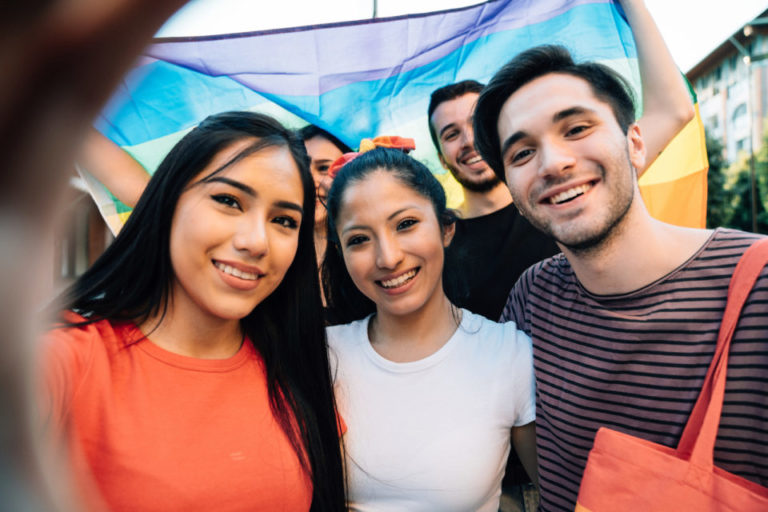

How do you fix higher rates of substance abuse and mental health issues among queer young people? The Youth Pride Coalition’s new Pride Toolkit is a good place to start.
•
Tiny La Grange, Texas—population 4,632—offers its young residents only a fraction of the extracurricular activities of, say, nearby Austin. Nevertheless, teenager February Hall discovered connection and community through the Boy Scouts of America, achieving the rank of Life Scout (the notch below Eagle). Then Hall came out as bisexual, and their troop expelled them.
Announcing their sexuality cost Hall, who is also transgender, their church and other social supports, too. Soon, Hall says, “I could only find community sharing cigarettes and getting my hands on any substance available.”
Now in recovery, Hall, 25, has since moved to Colorado, where they lead an opioid-prevention program for AmeriCorps in Boulder—and, for the past two years, has helped the Youth Pride Coalition (YPC) address substance abuse and mental health among LGBTQ youth in the Denver area, a mission that’s resulted in a new Pride Toolkit designed to help adults shape a safe community for queer and questioning kids. “All of my teenage experiences,” Hall says, “contribute to my work with the Pride Coalition.”
Created five years ago through a Colorado Department of Public Health and Environment (CDPHE) grant, the YPC is officially part of Denver Public Health. Doled out over five years in annual installments of $330,000 (some of the money also goes toward another, unrelated initiative), the grant supports YPC’s efforts to prevent queer youth in the state from sliding into the substance-abuse and mental-health abyss. It’s a trap that ensnares young people in the LGBTQ community at a disproportionately higher rate—according to CDPHE’s 2019 Healthy Kids Colorado Survey, “gay or lesbian (14.8 percent) and bisexual (9.8 percent) youth are more likely to have used prescription pain medicine without a doctor’s prescription in the last month than heterosexual youth (6.1 percent).”
The same report noted that LGBTQ youth in Denver are more likely to report that a feeling of sadness or hopelessness has prevented them from participating in extracurricular activities—and far more likely to have considered attempting suicide during the previous year.
To decide on the best course of action, the YPC invited a spectrum of community members—from parents to nonprofit leaders to school staff—to join its board. Crucially, several young people joined, too, and were paid for their time. “We wanted to make sure that the people most impacted are the ones affecting the change,” says Jessie Shay, a local public health consultant, social worker, and member of the YPC coalition. “They knew what they needed.”
What they needed, it turned out, was what Hall had in the Boy Scouts, and lost when they came out: Supportive adults in extracurricular spaces—but ones who understand how to be LGBTQ-affirming (meaning they not only accept queer youths, but encourage their participation). Organizations such as the Denver nonprofit Art From Ashes, which teaches struggling young people how to express themselves through art, already excel at making all kids feel welcome, Shay says, but not all extracurricular leaders have developed those skills to facilitate better LGBTQ youth health.
Although efforts to assess the needs of queer youth have been stifled by a lack of data, some research does support the benefits of having supportive adults to turn to. In 2011 the Gay, Lesbian, and Straight Education Network (GLSEN), a New York City-based nonprofit, published a survey that included the positive impacts of supportive educators on LGBTQ students. Three-fourths of the kids who said they didn’t have supportive educators at school felt unsafe there; that number dropped to just half for the pupils who had many supportive educators (six or more) in their lives. The latter also felt more a part of the school community and exhibited higher academic aspirations.
What’s more, the survey found that schools with comprehensive policies that addressed bias-based bullying and harassment reported fewer incidents of homophobic remarks. Hopefully, the YPC’s work will expand those advantages beyond the walls of the classroom.
The YPC determined the best way to achieve universal support of queer youth at the extracurricular level would be to provide high-quality educational resources to adult leaders of existing organizations. So the board got to work assembling vetted information on gender-affirming organizations in Colorado, and its members pored over strategies and research on preventing LGBTQ youth suicide and bullying.
The result of all that research launched on June 1. The Pride Toolkit—which is intended primarily for adults who have a role in mentoring queer young people, such as teachers or coaches, but can be accessed and used by anyone—includes three parts. The first, “Queer Youth Support Database,” is a listing of 75 LGBTQ-supportive organizations in Colorado, from Mile High Behavioral Health, a behavioral health counseling network in Denver and Aurora, to the Denver Mayor’s LGBTQ Commission, which advocates for queer issues.
The second part of the Toolkit, “Strategies and Research: LGBTQ Youth Suicide and Bullying,” links to the CPDHE’s Maternal and Child Health program’s suicide and bullying prevention guide as well as research reinforcing the disproportionate trauma young queer people face. The third, “Resources for Working With LGBTQ Youth,” is a catchall for resources that don’t align perfectly with the first two, including links to GLAAD, the Human Rights Campaign, and One Colorado, an LGBTQ advocacy group in Denver.
Despite the Toolkit’s publication, however, YPC’s mission is just beginning. The group recently received another five-year grant from CDPHE to continue strengthening its resource network—because caring for Colorado’s most vulnerable is a continuous mission. “Prevention work is really, really slow,” Hall says. “It’s gradual. We just hope this Toolkit can be part of the process.”
(Read More: Why Did Jamel Myles Die?)